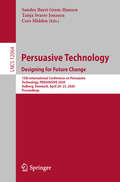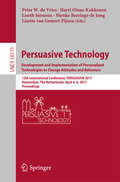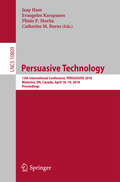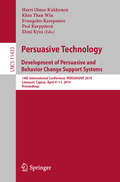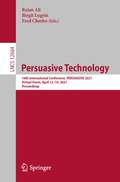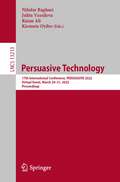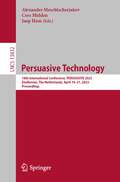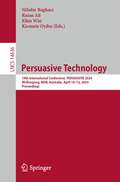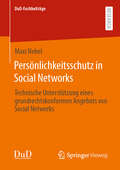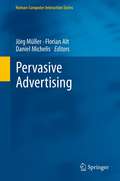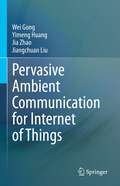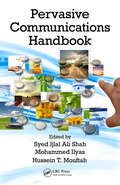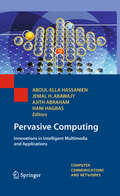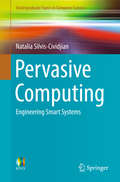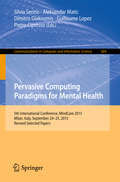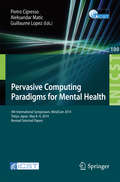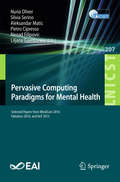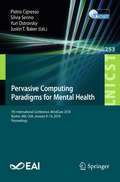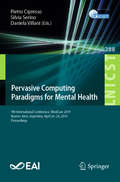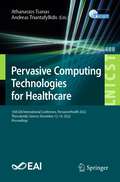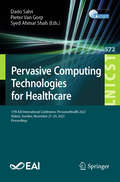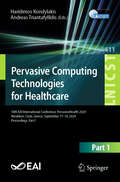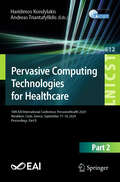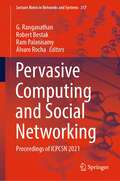- Table View
- List View
Persuasive Technology. Designing for Future Change: 15th International Conference on Persuasive Technology, PERSUASIVE 2020, Aalborg, Denmark, April 20–23, 2020, Proceedings (Lecture Notes in Computer Science #12064)
by Sandra Burri Gram-Hansen Tanja Svarre Jonasen Cees MiddenThis book constitutes the refereed proceedings of the 15th International Conference on Persuasive Technology, PERSUASIVE 2020, held in Aalborg, Denmark, in April 2020. The 18 full papers presented in this book were carefully reviewed and selected from 79 submissions. The papers are grouped in the following topical sections: methodological and theoretical perspectives on persuasive design; persuasive in practice, digital insights; persuasive technologies for health and wellbeing; persuasive solutions for a sustainable future; and on security and ethics in persuasive technology.
Persuasive Technology: 12th International Conference, PERSUASIVE 2017, Amsterdam, The Netherlands, April 4–6, 2017, Proceedings (Lecture Notes in Computer Science #10171)
by Peter W. de Vries, Harri Oinas-Kukkonen, Liseth Siemons, Nienke Beerlage-de Jong and Lisette van Gemert-PijnenThis book constitutes the refereed proceedings of the 12th International Conference on Persuasive Technology, PERSUASIVE 2017, held in Amsterdam, The Netherlands, in April 2017. The 23 revised full papers presented were carefully reviewed and selected from 85 submissions. The papers are grouped in topical sections on health(care), monitoring, and coaching; personality, personalization, and persuasion; motivations, facilitators, and barriers; design principles and strategies.
Persuasive Technology: 13th International Conference, Persuasive 2018, Waterloo, On, Canada, April 18-19, 2018, Proceedings (Lecture Notes in Computer Science #10809)
by Jaap Ham Evangelos Karapanos Plinio P. Morita Catherine M. BurnsThis book constitutes the refereed proceedings of the 13th International Conference on Persuasive Technology, PERSUASIVE 2018, held in Waterloo, ON, Canada, in April 2018. The 21 revised full papers and 4 short papers presented were carefully reviewed and selected from 59 submissions. The papers demonstrate how persuasive technologies can help solve societal issues. They explore new frontiers for persuasive technology, such as personalized persuasion, new sensor usage, uses of big data, and new ways of creating engagement through gaming or social connection, focusing on a variety of technologies (e.g., web, wearables, AI, and smart environments). The papers are organized in the following topical sections: social means to persuasion; nudging and just-in-time interventions; design principles and practices; persuasive games; personalization and tailoring; and theoretical reflections.
Persuasive Technology: 14th International Conference, PERSUASIVE 2019, Limassol, Cyprus, April 9–11, 2019, Proceedings (Lecture Notes in Computer Science #11433)
by Harri Oinas-Kukkonen Evangelos Karapanos Khin Than Win Pasi Karppinen Eleni KyzaThis book constitutes the refereed proceedings of the 14th International Conference on Persuasive Technology, PERSUASIVE 2019, held in Limassol, Cyprus, in April 2019. The 29 full papers presented were carefully reviewed and selected from 79 submissions. The papers demonstrate how persuasive technologies can help solve societal issues. They were subsequently grouped in the following topical sections: Terminologies and methodologies; self-monitoring and reflection; systems development process; drones and automotives; ethical and legal aspects; special application domains; motivation and goal setting; personality, age and gender; social support; user types and tailoring.
Persuasive Technology: 16th International Conference, PERSUASIVE 2021, Virtual Event, April 12–14, 2021, Proceedings (Lecture Notes in Computer Science #12684)
by Fred Charles Raian Ali Birgit LugrinThis book constitutes the refereed post-conference proceedings of the 16th International Conference on Persuasive Technology, PERSUASIVE 2021, held as a virtual event, in April 2021. The 17 full papers presented in this book together with 8 short papers were carefully reviewed and selected from 67 submissions. The papers are grouped in topical sections as follows: persuasive affective technology; digital marketing, ecommerce, etourism and smart ecosystems; and persuasion and education.
Persuasive Technology: 17th International Conference, PERSUASIVE 2022, Virtual Event, March 29–31, 2022, Proceedings (Lecture Notes in Computer Science #13213)
by Julita Vassileva Raian Ali Nilufar Baghaei Kiemute OyiboThis book constitutes the refereed post-conference proceedings of the 17th International Conference on Persuasive Technology, PERSUASIVE 2022, held as a virtual event, in March 2022. The 13 full papers presented in this book together with 7 short papers were carefully reviewed and selected from 46 submissions.
Persuasive Technology: 18th International Conference, PERSUASIVE 2023, Eindhoven, The Netherlands, April 19–21, 2023, Proceedings (Lecture Notes in Computer Science #13832)
by Alexander Meschtscherjakov Jaap Ham Cees MiddenThis book constitutes the refereed proceedings of the 18th International Conference on Persuasive Technology, PERSUASIVE 2023, held in Eindhoven, The Netherlands, April 19–21, 2023.The 24 full papers and 2 short papers included in this book were carefully reviewed and selected from 69 submissions. They were organized in topical sections as follows: Persuasive Technologies in Virtual and Augmented Reality; Persuasive Strategies; Persuasive Design and Applications; Methods for Tailoring and Personalisation; Artificial Persuasive Agents; Gamification; and Personal Factors in Persuasion.
Persuasive Technology: 19th International Conference, PERSUASIVE 2024, Wollongong, NSW, Australia, April 10–12, 2024, Proceedings (Lecture Notes in Computer Science #14636)
by Raian Ali Nilufar Baghaei Kiemute Oyibo Khin WinThis book constitutes the refereed post-conference proceedings the 19th International Conference on Persuasive Technology, PERSUASIVE 2024 held in Wollongong, NSW, Australia, during April 10–12, 2024. The 14 revised full papers and 8 short papers presented in this book were carefully reviewed and selected from 51 submissions. based on their content: methods for tailoring and personalization; persuasive design and applications, persuasive strategies; and persuasive technologies and ethics.
Persuasive Technology: Development and Implementation of Personalized Technologies to Change Attitudes and Behaviors
by Harri Oinas-Kukkonen Peter W. de Vries Liseth Siemons Nienke Beerlage-de Jong Lisette van Gemert-PijnenThis book constitutes the refereed proceedings of the 12th International Conference on Persuasive Technology, PERSUASIVE 2017, held in Amsterdam, The Netherlands, in April 2017. The 23 revised full papers presented were carefully reviewed and selected from 85 submissions. The papers are grouped in topical sections on health(care), monitoring, and coaching; personality, personalization, and persuasion; motivations, facilitators, and barriers; design principles and strategies.
Persönlichkeitsschutz in Social Networks: Technische Unterstützung eines grundrechtskonformen Angebots von Social Networks (DuD-Fachbeiträge)
by Maxi NebelDieses Buch befasst sich mit dem Schutz der Persönlichkeitsrechte der Nutzer von Social Networks. Es werden die Vorgaben der Datenschutz-Grundverordnung dezidiert auf Social Networks angewendet. Diese haben auf unionsrechtlicher Ebene mit dem Wirksamwerden der Datenschutz-Grundverordnung wichtige Veränderungen erfahren. Besondere Beachtung findet dabei die Verteilung der Verantwortlichkeit auf Anbieter und Nutzer, die durch die komplexen Datenverarbeitungsvorgänge in Social Networks in der Praxis sehr vielschichtig sind. Außerdem werden mithilfe der interdisziplinären Methode KORA aus verfassungsrechtlichen Vorgaben und Anforderungen rechtliche Kriterien identifiziert und organisatorische und technische Gestaltungsziele entwickelt, um eine rechtsverträgliche Systemgestaltung von Social Networks anzustoßen.Maxi Nebel ist wissenschaftliche Mitarbeiterin in der Projektgruppe verfassungsverträgliche Technikgestaltung (provet) unter der Leitung von Prof. Dr. Alexander Roßnagel am Wissenschaftlichen Zentrum für Informationstechnik-Gestaltung (ITeG) an der Universität Kassel. Sie ist Mitglied im Forum Privatheit.
Pervasive Advertising
by Daniel Michelis Florian Alt Jörg MüllerThis book looks at the future of advertising from the perspective of pervasive computing. Pervasive computing encompasses the integration of computers into everyday devices, like the covering of surfaces with interactive displays and networked mobile phones. Advertising is the communication of sponsored messages to inform, convince, and persuade to buy. We believe that our future cities will be digital, giving us instant access to any information we need everywhere, like at bus stops, on the sidewalk, inside the subway and in shopping malls. We will be able to play with and change the appearance of our cities effortlessly, like making flowers grow along a building wall or changing the colour of the street we are in. Like the internet as we know it, this digitalization will be paid for by adverts, which unobtrusively provide us suggestions for nearby restaurants or cafés. If any content annoys us, we will be able to effortlessly say so and change it with simple gestures, and content providers and advertisers will know what we like and be able to act accordingly. This book presents the technological foundations to make this vision a reality.
Pervasive Ambient Communication for Internet of Things
by Jiangchuan Liu Wei Gong Yimeng Huang Jia ZhaoThis book covers several essential aspects of pervasive ambient backscatter communication, one of the most cutting-edge technologies for Internet-of-Things. It begins with introductory Part I, which presents visions, basic concepts, principles, and paradigms of ambient backscatter. Also, a taxonomy of state-of-the-art ambient backscatter systems is provided from the perspective of the OSI model. Part II and III study how ambient backscatter systems work on the communication and networking levels. Specifically, Part II discusses in detail how to make use of ambient WiFi signals to provide high-throughput backscatter communications with WiFi 1 (chapter 5), WiFi 2-3 (chapter 4), WiFi 4 (chapter 3), WiFi 5-6 (chapter 6) standards. Further, Part III includes several of the most advanced ambient backscatter network solutions, which are made possible by the first multi-hop backscatter (chapter 7), first backscatter mesh (chapter 8), and multiprotocol backscatter (chapter 9). On top of reliable communication and networks, we propose two novel applications that are thought impossible before, lightweight spatial sound recording over the air (chapter 10) and self-powered wireless wearables for healthcare (chapter 11). To conclude the monograph, we point out critical challenges for realizing the vision of pervasive backscatter IoTs and potential directions of ambient backscatter applications. The book provides an in-depth understanding of ambient backscatter technologies. In particular, we mainly take ubiquitous WiF signals as the communication sources and adopt a top-down approach to introduce three crucial subjects: WiFi backscatter communication, ambient backscatter network, and self-powered application systems. For each subject, we carefully divide it into several relatively independent topics, which come with the latest advances in pervasive backscatter and include extensive discussions of closely related state-of-the-art methodologies.
Pervasive Communications Handbook
by Hussein T. Mouftah Mohammad Ilyas Syed Ijlal Ali ShahIn an emergency, availability of the pervasive communications environment could mean the difference between life and death. Possibly one of the first guides to comprehensively explore these futuristic omnipresent communications networks, the Pervasive Communications Handbook addresses current technology (i.e., MAC protocols and P2P-based VoD architecture) and developments expected in the very near future, when most people and places will be virtually connected through a constant and perpetual exchange of information. This monumental advance in communications is set to dramatically change daily life, in areas ranging from healthcare, transportation, and education to commerce and socialization. With contributions from dozens of pioneering experts, this important reference discusses one-to-one, one-to-many, and many-to-one exchanges of information. Organized by the three key aspects—technology, architecture, and applications—the book explores enabling technologies, applications and services, location and mobility management, and privacy and trust. Citing the technology’s importance to energy distribution, home automation, and telecare among other areas, it delves into topics such as quality of service, security, efficiency, and reliability in mobile network design, and environment interoperability.
Pervasive Computing
by Ajith Abraham Aboul-Ella Hassanien Hani Hagras Jemal H. AbawajyThis volume provides state-of-the-art coverage of the diverse topics related to pervasive computing and intelligent multimedia technologies. The use of different computational intelligence-based approaches to various problems in pervasive computing are examined, including video streaming, intelligent behavior modeling and control for mobile manipulators, tele-gaming, indexing video summaries for quick video browsing, web service processes, virtual environments, ambient intelligence, and prevention and detection of attacks to ubiquitous databases. Topics and features: includes a comprehensive overview, providing a thorough literature review; examines virtual reality technology, and mobile virtual environments; describes various approaches in ambient intelligence for home health care for the elderly and those suffering from Alzheimer's disease, and for volcano monitoring; investigates issues in web services and situation awareness in pervasive computing environments; explores wireless network applications.
Pervasive Computing
by Natalia Silvis-CividjianThis book provides a concise introduction to Pervasive Computing, otherwise known as Internet of Things (IoT) and Ubiquitous Computing (Ubicomp) which addresses the seamless integration of computing systems within everyday objects. By introducing the core topics and exploring assistive pervasive systems which infer their context through pattern recognition, the author provides readers with a gentle yet robust foundation of knowledge to this growing field of research. The author explores a range of topics including data acquisition, signal processing, control theory, machine learning and system engineering explaining, with the use of simple mathematical concepts, the core principles underlying pervasive computing systems. Real-life examples are applied throughout, including self-driving cars, automatic insulin pumps, smart homes, and social robotic companions, with each chapter accompanied by a set of exercises for the reader. Practical tutorials are also available to guide enthusiastic readers through the process of building a smart system using cameras, microphones and robotic kits. Due to the power of MATLAB(tm), this can be achieved with no previous programming or robotics experience. Although Pervasive Computing is primarily for undergraduate students, the book is accessible to a wider audience of researchers and designers who are interested in exploring pervasive computing further.
Pervasive Computing Paradigms for Mental Health
by Silvia Serino Aleksandar Matic Dimitris Giakoumis Guillaume Lopez Pietro CipressoThis book constitutes the refereed proceedings of the 5th International Conference on Pervasive Computing Paradigms for Mental Health, MindCare 2015, held in Milan, Italy, in September 2015. The 23 full papers and 6 short papers presented were carefully reviewed and selected from 40 submissions. The papers deal with the use of technologies in favor of maintaining and improving mental wellbeing. They focus on building new computing paradigms and on addressing a multitude of challenges in mental healthcare, for example in psychiatric and psychological domains with emphasis on new technologies, such as video and audio technologies and mobile and wearable computing.
Pervasive Computing Paradigms for Mental Health
by Aleksandar Matic Guillaume Lopez Pietro CipressoThis book constitutes revised post-proceedings of the 4th International Symposium on Pervasive Computing Paradigms for Mental Health, MindCare 2014, held in Tokyo, Japan, in May 2014. The 11 full and 5 short papers presented were carefully reviewed and selected from 26 submissions for inclusion in the proceedings. The papers are organized in topical sections on recognition and assessment, mental health management, improving communication, depression, and self-applied treatments.
Pervasive Computing Paradigms for Mental Health: 4th International Symposium, Mindcare 2014, Tokyo, Japan, May 8-9, 2014, Revised Selected Papers (Lecture Notes of the Institute for Computer Sciences, Social Informatics and Telecommunications Engineering #100)
by Liljana Gavrilovska Silvia Serino Aleksandar Matic Pietro Cipresso Nenad Filipovic Nuria OliverThis book constitutes the refereed proceedings of the 6th International Symposium on Pervasive Computing Paradigms for Mental Health, MindCare 2016, held in Barcelona, Spain, in November 2016, and the Second International Conference of Future Access Enablers of Ubiquitous and Intelligent Infrastructures, Fabulous 2016, Belgrade, Serbia, October 24-26, 2016, and the Third International Conference on Interoperability in IoT, IIoT 2015, Rome, Italy, October 26-27, 2015. The 24 papers were selected from 32 submissions. MindCare presents technologies in favor of maintaining and improving psychological well-being. Fabulous presents broad areas of future wireless networks, ambient and assisted living and smart infrastructures in order to interact, exchange ideas, expertise, experience and know-how. And finally IIoT presents tools and services in home automation and industrial service.
Pervasive Computing Paradigms for Mental Health: 7th International Conference, MindCare 2018, Boston, MA, USA, January 9–10, 2018, Proceedings (Lecture Notes of the Institute for Computer Sciences, Social Informatics and Telecommunications Engineering #253)
by Silvia Serino Pietro Cipresso Yuri Ostrovsky Justin T. BakerThis book constitutes the refereed proceedings of the 7th International Conference on Pervasive Computing Paradigms for Mental Health, MindCare 2018, held in Boston, MA, USA, Jin January 2018. The 19 papers presented were carefully reviewed and selected from 30 submissions and present advanced computing and communication technologies from the use of wearable sensors and ecological virtual environments to use of big data and machine learning techniques. These technologies can be used to support and promote the well-being through an objective continuous data collection and personalized
Pervasive Computing Paradigms for Mental Health: 9th International Conference, MindCare 2019, Buenos Aires, Argentina, April 23–24, 2019, Proceedings (Lecture Notes of the Institute for Computer Sciences, Social Informatics and Telecommunications Engineering #288)
by Silvia Serino Pietro Cipresso Daniela VillaniThis book constitutes the refereed proceedings of the 9th International Conference on Pervasive Computing Paradigms for Mental Health, MindCare 2019, held in Buenos Aires, Argentina, in April 2019. The 22 papers presented were carefully reviewed and selected from 38 submissions and present new paradigms in mental healthcare, in parallel with compelling questions about how it is possible to promote and structure these changes to improve physical well-being.
Pervasive Computing Technologies for Healthcare: 16th EAI International Conference, PervasiveHealth 2022, Thessaloniki, Greece, December 12-14, 2022, Proceedings (Lecture Notes of the Institute for Computer Sciences, Social Informatics and Telecommunications Engineering #488)
by Athanasios Tsanas Andreas TriantafyllidisThis book constitutes the refereed proceedings of the 16th EAI International Conference on Pervasive Computing Technologies for Healthcare, PervasiveHealth 2022, which took place in Thessaloniki, Greece, in December 2022.The 45 full papers included in this volume were carefully reviewed and selected from 120 submissions. The papers are organized in the following topical sections: personal informatics and wearable devices; computer vision; IoT-HR: Internet of things in health research; pervasive health for COVID-19; machine learning, human activity recognition and speech recognition; software frameworks and interoperability; facial recognition, gesture recognition and object detection; machine learning, predictive models and personalised healthcare; human-centred design of pervasive health solutions; personalized healthcare.
Pervasive Computing Technologies for Healthcare: 17th EAI International Conference, PervasiveHealth 2023, Malmö, Sweden, November 27-29, 2023, Proceedings (Lecture Notes of the Institute for Computer Sciences, Social Informatics and Telecommunications Engineering #572)
by Pieter Van Gorp Dario Salvi Syed Ahmar ShahThis book constitutes the refereed proceedings of the 17th EAI International Conference on Pervasive Computing Technologies for Healthcare, PervasiveHealth 2023, held in Malmö, Sweden, during November 27-29, 2023. The 29 full papers and 6 short papers were selected from 90 submissions and are organized in thematic sessions as follows: Pervasive Mental Health; Privacy, Ethics and Regulations; Datasets and Big data Processing; Pervasive health for Carers; Pervasive Health in Clinical Practice; Remote Monitoring; Patient and User Aspects; Motion and rehabilitation; Workshop on the Internet of Things in Health Research; Posters and demos (non indexed annex).
Pervasive Computing Technologies for Healthcare: 18th EAI International Conference, PervasiveHealth 2024, Heraklion, Crete, Greece, September 17–18, 2024, Proceedings, Part I (Lecture Notes of the Institute for Computer Sciences, Social Informatics and Telecommunications Engineering #611)
by Andreas Triantafyllidis Haridimos KondylakisThe two-volume set LNICST 611 and LNICST 612 constitutes the refereed proceedings of the 18th EAI International Conference on Pervasive Computing Technologies for Healthcare, PervasiveHealth 2024, held in Heraklion, Crete, Greece, during September 17–18, 2024. The 45 full papers included in these proceedings were carefully reviewed and selected from 120 submissions. They were split in topical sections as follows: Part I : Patient Empowerment; Artificial Intelligence; Medical Imaging; Education. Part II : Education; mHealth and Telemonitoring; 3rd IOT-HR: Workshop on Internet of Things in Health Research; Posters
Pervasive Computing Technologies for Healthcare: 18th EAI International Conference, PervasiveHealth 2024, Heraklion, Crete, Greece, September 17–18, 2024, Proceedings, Part II (Lecture Notes of the Institute for Computer Sciences, Social Informatics and Telecommunications Engineering #612)
by Andreas Triantafyllidis Haridimos KondylakisThe two-volume set LNICST 611 and LNICST 612 constitutes the refereed proceedings of the 18th EAI International Conference on Pervasive Computing Technologies for Healthcare, PervasiveHealth 2024, held in Heraklion, Crete, Greece, during September 17–18, 2024. The 45 full papers included in these proceedings were carefully reviewed and selected from 120 submissions. They were split in topical sections as follows: Part I : Patient Empowerment; Artificial Intelligence; Medical Imaging; Education. Part II : Education; mHealth and Telemonitoring; 3rd IOT-HR: Workshop on Internet of Things in Health Research; Posters
Pervasive Computing and Social Networking: Proceedings of ICPCSN 2021 (Lecture Notes in Networks and Systems #317)
by Álvaro Rocha Robert Bestak Ram Palanisamy G. RanganathanThe book features original papers from International Conference on Pervasive Computing and Social Networking (ICPCSN 2021), organized by NSIT, Salem, India during 19 – 20 march 2021. It covers research works on conceptual, constructive, empirical, theoretical and practical implementations of pervasive computing and social networking methods for developing more novel ideas and innovations in the growing field of information and communication technologies.
